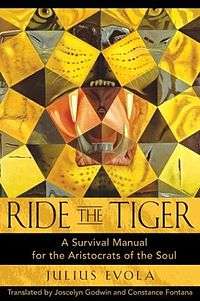Ride the Tiger
|
Cover to the 2003 English translation | |
| Author | Julius Evola |
|---|---|
| Original title | Cavalcare la Tigre |
| Country | Italy |
| Language | Italian |
| Published | 1961 |
Ride the Tiger (Italian: Cavalcare la Tigre) is a 1961 book by Italian Traditionalist philosopher Julius Evola. The first English translation (translated by Joscelyn Godwin and Constance Fontana) was published by Inner Traditions in 2003 (ISBN 0-89281-125-0).
In Ride the Tiger, Evola argues that the modern world has become totally corrupt and that the institutions and traditions of the ancient world that once allowed a person to fully realize his being have been lost. The work expands upon the Radical Traditionalist ideas which Evola developed in Revolt Against the Modern World and offers a solution to the problem of living in the modern world different from the reactionary revolution he argued for in Men Among the Ruins. The principal metaphor of the book is its title. Evola argues that in order to survive in the modern world an enlightened or "differentiated man" should "ride the tiger". As a man, by holding onto the tiger's back may survive the confrontation, so too might a man, by letting the world take him on its inexorable path be able to turn the destructive forces around him into a kind of inner liberation. While the traditional world described in Revolt Against the Modern World would allow a man to fully realize his being in a united society, the world Evola describes in Ride the Tiger is much lonelier and even more pessimistic. Despite its pessimism, it is a testament to his belief that no matter how lost civilization may be, there always exists the ability for the individual person to live his life always looking "above" himself and thus achieving enlightenment.
Quotations
From the Book
- "This restriction must be kept in mind. What I am about to say does not concern the ordinary man of our day. On the contrary, I have in mind the man who finds himself involved in today's world, even at its most problematic and paroxysimal points; yet he does not belong inwardly to such a world, nor will he give in to it. He feels himself, in essence, as belonging to a different race from that of the overwhelming majority of his contemporaries."
External links
- "Reader reviews". Archived from the original on September 28, 2007. Retrieved January 4, 2005.
